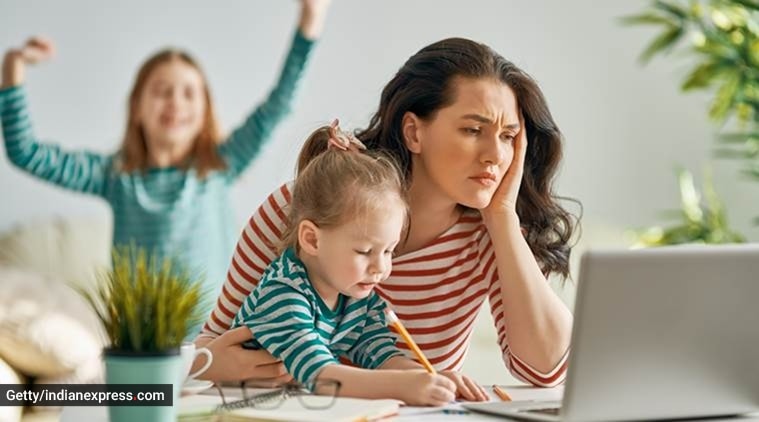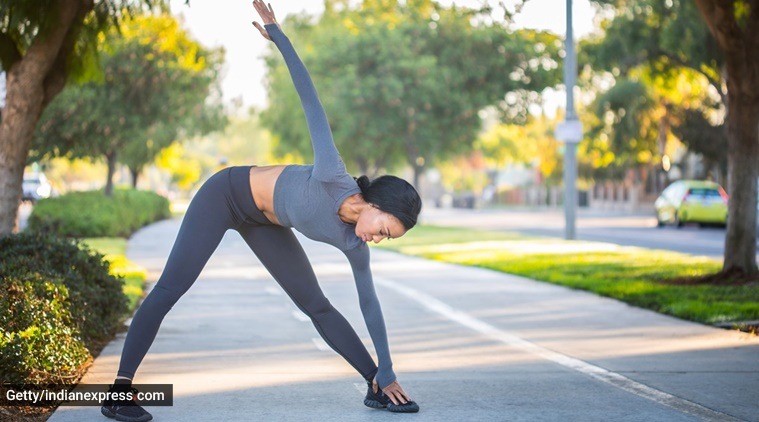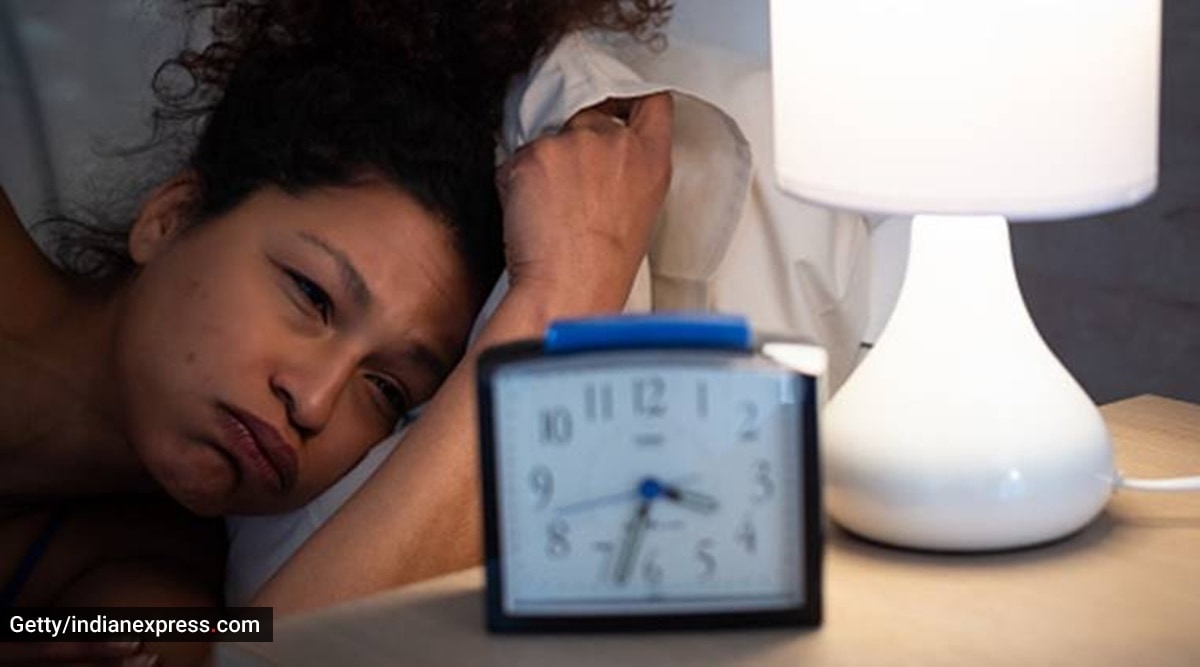Suffering from post-Covid sleeplessness, insomnia? Here’s what to know
From having a glass of milk at bedtime to working out every day and also listening to soothing music, Chhavi Auplish tried every trick in the book to get “adequate sleep” every night. But to no avail. She struggled even after three months of recovery from Covid-19, “I still can’t get back to my normal sleeping routine,” rued the 27-year-old, who used to “enjoy eight hours of sound sleep prior to the infection”.
“Now it’s like a zig-zag. One night, I sleep for seven hours, on others, it’s merely three hours. Like today, I’m on leave because I couldn’t sleep properly last night. Daytime has become all about stress accompanied by body aches and headaches which have become too frequent post-Covid. I have never had such problems before,” Delhi-based Chhavi told indianexpress.com.
Like Chhavi, 35-year-old Parul Parmar has also been experiencing something similar. “My sleeping habits have become inconsistent. I occasionally stay up all night, which makes me drowsy during the day — which can be at 7 am or noon. But I am still unable to sleep, and ultimately only get three to four hours of sleep per day,” the Mumbai resident shared.
Parul tried yoga “to help me unwind and fall asleep”. “I even forced myself to sleep by putting my phone and other distractions aside. I tried listening to soothing music, but it didn’t help,” she mentioned. While she is not clinically diagnosed with insomnia, she can sense that her lack of sleep is making her “feel agitated easily”. “It’s sometimes difficult for me to focus on anything. I believe it also has an impact on my daily schedule because there is no set time for breakfast, lunch, or dinner. This, in turn, has impacted my health and even my menstrual cycle,” she said.
According to experts, Covid-19 has not only impacted people physically, but also mentally. “A lot of people are battling depression, stress, anxiety, frustration due to job loss, and even insomnia. Not only this, but many people are also complaining of insomnia even after recovering,” said Dr Navneet Kaur, general physician, Apollo Spectra Nehru Enclave, Delhi.
What is insomnia?
Insomnia can be described as a sleep disorder wherein one fails to get a good night’s sleep which affects the regular sleep cycle of the person. This will halt the person’s recovery and give rise to many other health issues, said Dr Kaur.
Amid Covid-19, sleeplessness and or sleep-related issues have been termed as ‘coronasomnia‘. “On an average, 70 per cent of our post-covid patients in all age groups have complaints related to sleep-wake cycle, mood and behaviour. The reason is mainly post-Covid stress and in some cases, irrational use of steroids during the treatment,” said Dr Charu Dutt, infectious disease specialist and home care expert at Asian Institute of Medical Sciences, Faridabad.
Symptoms
Insufficient sleep, tiredness during daytime, not feeling active, waking up too early, waking up many times during the night, depression, anxiety, lack of concentration, irritability, being moody, and difficulty in remembering due to lack of sleep.
But why are people unable to sleep amid pandemic?
People are encountering insomnia owing to the stress, which can be due to various reasons like loss of jobs, loneliness due to staying alone, being in quarantine, being in the hospital, financial difficulties, and even due to other health issues such as cancer, heart or liver problems, said Kaur.
Even Ayurvedic practitioners like Dr Partap Chauhan, director, Jiva Ayurveda, have been receiving many complaints. “The reason behind this could be panic attacks and severe stress issues caused by the loss of their loved ones due to Covid-19. The virus not only affects the lungs, but also damages the nervous system making it so weak that, even the slightest disturbance could affect the brain. In Ayurveda, this is known as Vata aggravation. When Vata increases in our body, it impacts our brain which eventually results in insomnia. Post-Covid, the body becomes fragile and immunity level is less. In Ayurveda, there is a term called Ojas, which manages the immune system as well as mental well-being. Deficiency of Ojas could result in weak immunity, which in turn disturbs mental health,” he explained.
 Many people’s sleeping habits have become inconsistent. (Source: Getty Images/Thinkstock)
Many people’s sleeping habits have become inconsistent. (Source: Getty Images/Thinkstock)
What can be done?
By counselling and changing the lifestyle, people might be able to overcome/deal with insomnia. In severe cases, medication like anxiolytics and sleeping pills can be prescribed to them for a shorter duration of time, said Dr Kaur.
“I prescribe medications only if the patient has high blood pressure and diabetes along with insomnia,” Ayurvedic practitioner Dr Dixa Bhavsar, who is currently seeing many high blood sugar and cholesterol level patients with half of them experiencing sleep-related issues, told indianexpress.com.
Cannabis or CBD oil for insomnia treatment?
Cannabidiol or CBD oil made by extracting CBD from the cannabis plant has been touted to be a popular, natural remedy for overcoming stress and providing pain relief. “No, CBD oil is not effective in such cases,” said Dr Dutt. According to Dr Chauhan, “cannabis is not advisable for regular use in case of insomnia”. “Cannabis is mostly used for pain management, but if one is using it in the treatment of insomnia, they must be very cautious because it is very addictive,” he said.
One could even opt for simple home remedies, suggested Dr Chauhan.
*Soak almonds (7-8), dates (3-4) and walnuts (2-3) in water overnight. In the morning make a paste and mix it with a cup of milk. A pinch of cinnamon powder and one piece of cardamom can be added for better results.
*Head and feet massages also induce better sleep.
*A nice aroma, with soothing music or a chant (e.g. OM) could help the mind get calmer.
*Herbs like Brahmi and Shankpushpi helps in curing insomnia.
*Reduce gadget use and the intake of caffeine and alcohol.
*Yoga and Pranayama are advisable as it enhances the breathing capacity and breathing is closely related to the mind. The slower you breathe the calmer is your mind.
*Following a saatvic lifestyle could be very helpful in overcoming not just insomnia but all kinds of chronic diseases. Panchkarma is also a very effective treatment for insomnia post-Covid.
Dr Bhavsar shared that ayurvedic teas like brahmi tea, ashwagandha tea, arjun tea, chamomile tea, and mint tea can also help.
Medical experts express that to tackle insomnia, one has to set a proper sleep routine. “Follow the same sleeping and wake up timings every day, limit your access to electronic gadgets, avoid using a smartphone just before sleeping, avoid caffeinated beverages that can interfere with your sleep pattern. Exercising on a daily basis will help you sleep better. Make sure that the room temperature is conducive to sleeping. Use a good pillow and mattress and avoid drinking too much water before sleeping as you will have to make those constant trips to the toilet and your sleep will be disturbed,” said Dr Kaur.
 Experts suggest it is important to get some exercise in the day to have sound sleep post-Covd. (Source: Getty Images/Thinkstock)
Experts suggest it is important to get some exercise in the day to have sound sleep post-Covd. (Source: Getty Images/Thinkstock)
Dr Dutt recommends a few steps
*Deep breathing exercises and meditation
*Maintain a daily routine
*Avoid caffeine use in the evenings
*Avoid making your bedroom an office space
*Get ample amount of sunlight
*Avoid naps in the daytime
*Cut back on the news and social media especially during evening time
*Don’t have late dinners
Addressing questions that yoga and meditation haven’t been able to help, Dr Bhavsar said, “Yoga and pranayamas are 100 per cent effective if done with discipline straight for two weeks.”
However, in case these are not effective, it is recommended to consult a sleep therapist for cognitive-behavioural therapy. “Patients tend to self medicate with sleeping pills and add an extra glass of wine to induce sleep. But these should not be encouraged as they have long-term adverse effects. Don’t panic if you are unable to sleep for a night or so. However, if the condition persists and becomes chronic, meet your primary Covid care specialist for proper treatment and counselling sessions. Right medication and meditation are the keys to overcome such issues,” noted Dr Dutt.
For more lifestyle news, follow us: Twitter: lifestyle_ie | Facebook: IE Lifestyle | Instagram: ie_lifestyle
For all the latest health News Click Here

